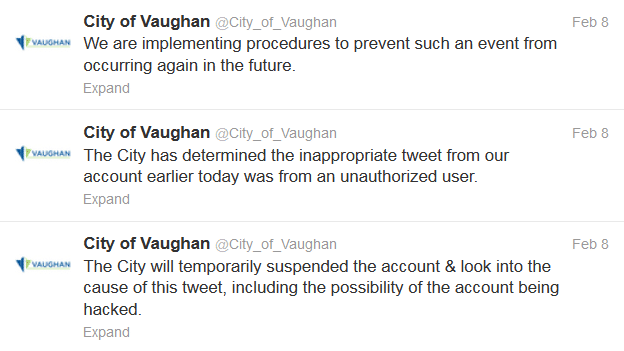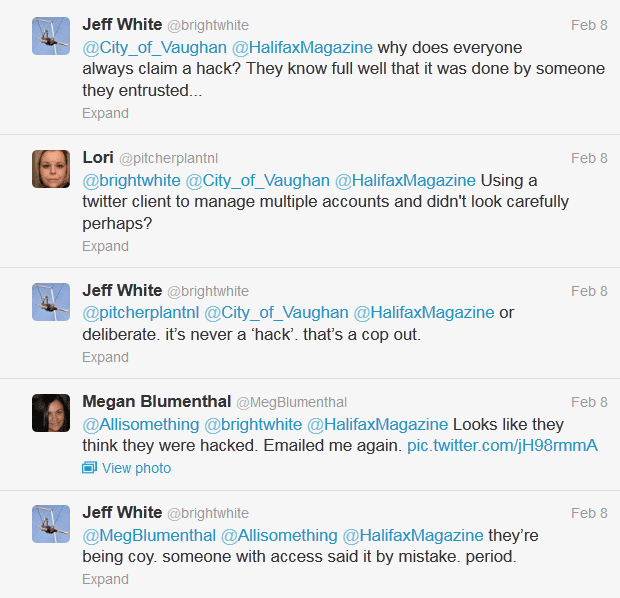Errant tweets, offended followers and weak crisis management – a bad combination
The city of Vaughan, located a bit north of Toronto, was the latest organization to find itself in crisis as a result of rogue tweets. Last week, in the midst of a snowstorm, the following tweet went out from the city’s official Twitter account, @City_of_Vaughan:
“Everyone on my street has double gararges…who are these f*cknuts who don’t put their car in the garage when we get 2 feet of snow? #dumb”
Not exactly the type of message that residents of Vaughan, who were likely following the account to keep up on local news and events, expected to see from their city leaders, right?
The fallout
While those commenting on the tweet mostly appeared aware that the rude message wasn’t intended to go out from the city feed, officials took flak for the fact that it went out at all. Of course, the post was quickly deleted, and the crisis management began.
Not long after the deletion, the city posted the following message to its feed:

A few hours later, more messages went up, and it became clear the city was pulling out the ever-popular, “we were hacked” excuse.

The average person is a lot more web-savvy than they were just a few years ago, however, and the suggestion that someone would hack or otherwise infiltrate the city’s social media account just to post a single personal complaint didn’t go over too well with followers:

Of course, what made it even more difficult to believe is the fact that the day before the #dumb tweet went out, a post went out from the @City_of_Vaughan account with the text, “Hmmm don’t think I’ll starve during this #snowstorm…” accompanied by a picture of a table covered in junk food. That tweet was also criticized by followers and then deleted.
Given the two tweet’s similar tone and style, it’s not hard to put two and two together and figure out that someone who posts regularly for the city had made a couple of mistakes.
Learning from mistakes
What can we learn from this whole mess? First off, for social media managers, double and triple check which account you’re posting from, especially if the content could be considered offensive. Better yet, don’t be a jerk online at all. That way you won’t have to worry about creating a crisis.
For those impacted by rogue or accidental tweets – stop with the “we were targeted by a hacker” nonsense. If a hacker hits your account they’re either going to lurk quietly and steal information or they’re going to do a lot worse than take digs at the average level of intelligence in your neighborhood.
People are perfectly willing to accept that someone had a bad day and mistakenly posted from the wrong Twitter account. What they won’t stand for is being lied and talked down to, as if they don’t know how the Internet works.
Being dishonest is the #1 way to trash your own reputation. If you have accidental tweets go out you need to step up and say, “Hey, we’re really sorry about this but we made a mistake and posted to the wrong Twitter account. We are implementing policy to prevent this from happening again, and sincerely apologize to anyone we offended with the errant tweet.”
That is, quite literally, all you need to do for crisis management with these straightforward cases. No fancy maneuvers, no press conferences, just put that out, spend some time addressing further questions from followers (if there are any) and your social media crisis should resolve itself.
The BCM Blogging Team
https://www.bernsteincrisismanagement.com/

Comments 4
I am authorized to tweet from my corporate account and for a long time I didn’t even have the account setup on my phone – for just such a reason. I didn’t trust myself enough to not make the mistake (especially after a beverage or two). After I became more comfortable with my online presence I added the account and I will occasionally tweet on behalf of work. I double check the account first and make sure my default is always my personal account.
Your proposed crisis management solution is perfect. It’s a shame there are not enough companies out there who will take the time to read up on this before reacting to a bad situation. At least they got the “delete the post ASAP” part!
Author
Thanks for the comment Andrew! I’m right there with you as far as your take on social media and the phone, I do have HootSuite set up there now complete with client profiles but I never even consider posting unless I can be 100% focused on the task at hand. Even then I’m borderline paranoid, checking repeatedly to make certain that it’s set to publish to the right account.
I stopped using Hootsuite once I setup my work account.. I use the Twitter app for iPhone now specifically so that it’s a couple steps for me to switch accounts over. My company doesn’t have a social media policy that I know of. They handed me a user ID and password and said “off you go”. #dangerous
On a side note, if I go to your main blog page https://www.bernsteincrisismanagement.com/blog there doesn’t appear to be any links that indicate there are comments on any of the posts. I had to click the title to come into the individual article to see if there were comments. Food for thought :)
Author
Ah, food for thought indeed! I’ve just added a widget to our main sidebar that displays recent comments but I’ll be on the lookout for an even better way to draw attention to the fact that we love to talk about what we write, thank you!